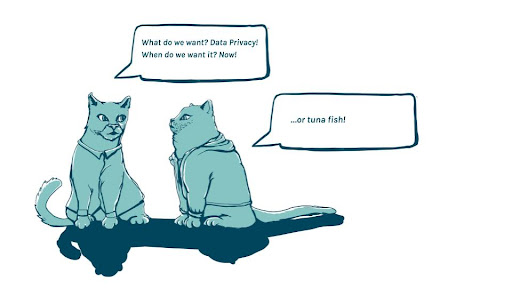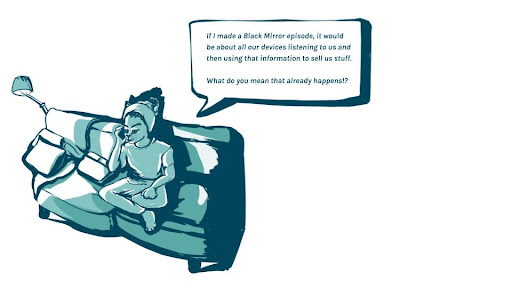
Demand for Data Privacy Results in Content Marketing Surge
Our story begins with a woman, mid-40s, single, preparing for her day. Her name? Target Avatar, but her friends call her Tartar (because: Tar-get Ava-tar). It’s a normal day—she attends her favorite vinyasa flow class before logging on to work. She takes exactly four snack-and-walk breaks before signing off, then meets her friends for dinner and drinks.
Seemingly insubstantial, this story does have a twist (cue suspenseful Hitchcock music). Tartar doesn’t realize it, but there’s a hidden figure always lurking in the shadows. This hidden figure, let’s name it Cookies, never physically threatens Tartar; it just jots down everything there is to know about her.
Cookies writes down what Tartar does and doesn’t do. Her likes and dislikes. Her location, where she works, who she’s friends with, her favorite bar. It even knows her favorite yoga position (bakasana; crow pose).
If Tartar’s story occurs in the physical world, we’d call it creepy (and we’d call the cops). But when it happens online, we call it… well, being online.
Loose Data Privacy Restrictions—Who Doesn’t Love Cookies?
Thanks to the ubiquity of third-party user-behavior tracking platforms, being observed online has become normalized. But why is tracking user data so valuable?
Advertisers can use Cookies to measure users’ search history, shopping preferences, favorite yoga poses—just about anything. They then use that information to connect businesses with their target audience (or they sell that data to other third parties who can use that data any way they see fit).
Cookies are exciting for advertisers and businesses. There’s just one slight problem—the users have to give up their right to data privacy.
Now, Tartar’s starting to get wise to Cookies’ shenanigans.

Consumer Awareness Around Data Privacy Hasn’t Changed. Consumer Expectation Has.
Like Tartar, the world is catching on to how their data is being used by third parties. And it’s no secret the US’s online privacy and personal data laws could use an upgrade. For years, Pew Research Center has tracked public perception of data privacy and spun the same tale.
- As far back as 2014, 91% of adults surveyed felt that they had lost control over how companies collected and used their data.
- By 2020, only 4% of those surveyed were “very confident” social media sites kept their personal data safe.
Though it was keenly felt nearly a decade ago, consumer awareness of privacy concerns has finally reached the tipping point—consumer expectation has changed.
And when consumer expectation changes, businesses respond.
Apple’s iOS 14 Data Privacy Update
Apple responded to consumers’ privacy demands by enacting a new data-privacy policy in 2021. In short, the update forces developers to request access to user data (rather than assuming they have access prior).
If you own an Apple device, you’re likely familiar with the pop-up that asks if an application can track your activity cross-application. You’re then granted one of two options:
“Ask App Not to Track” or “Allow”
As you can imagine, it’s a simple choice for most users. (Tartar hits that “Ask App Not to Track” button harder than her vinyasa flow class).
The implications have had cascading effects.
Consumer Privacy vs Advertising Giants: A David and Goliath Tale
One seemingly minor change—asking users if they want their data tracked across platforms and other websites—was the proverbial stone from David’s slingshot against Goliath.
This win for individual privacy resulted in a $10 billion blow in revenue for Facebook, and the disruption continues to ripple through advertising companies operating across the US:
- Magneti publicly announced that their clients using Facebook and Instagram paid advertising will be closely monitored and likely pivoted toward more organic channels.
- Taboola CEO Adam Singolda published an op-ed where he postulated Apple’s privacy update would result in a massive uptick in contextual marketing. This marketing effort is reliant on the circumstances of the user’s current activity and providing the right content at the right time. It’s the marketing equivalent of handing a takeout menu to someone who’s just finished binging Salt Fat Acid Heat.
- From the Goliath’s mouth, Facebook stated small businesses saw a 60% decrease in sales per dollar spent when they didn’t have access to user data, leading to a decreased demand in paid ad spend.
So, when you can’t follow Tartar around her digital adventure, how are businesses supposed to target her and “encourage” her to purchase products and services?
Good ol’ non-GMO, organic marketing.
The Golden Age of Content Marketing Got a Little Sparklier
All companies rely on content marketing to some degree. Every paid ad needs a landing page, every product needs a product page, and businesses need a digital presence (website). For many, content is the primary outlet.
Content helps companies broadcast their mission statement. When done right, it speaks to the audience they want to build and helps them rank high on search engines.
The demand for content has exploded for a number of reasons, the two largest being:
- Search engines favor consistent content – The science of SEO has morphed into a 38+ billion dollar industry over the last decade, creating a massive need for content quantity. If businesses want to compete, they have to outperform and out-produce. And it’s not enough to create content once; you need continuous output.
- Curating content for the human experience – In tandem, Google’s algorithm continually updates in favor of the user experience with metrics like dwell time, click-through rates, and bounce rates and features like snippets. This necessitated that the volume needed to be quality content—content that articulates user search queries and provides readers value.
Add to this the plummeting demand for paid ad which will push marketing dollars to organic channels and you can see why we’re in the Golden Age of Copy (Copycat’s endearing nod to the Golden Age of Television).
The need for high-quantity and high-quality content is rising.
Why Content Can’t Be Dethroned—A Simple Theory
Users like Tartar are still going about their days—purchasing new outfits, taking yoga classes, and searching “how are double rainbows formed” online. The only change is that third-party user-behavior tracking (e.g., third-party Cookies) is disappearing. And Apple’s privacy change is only the first domino to fall. Personal data needs to be protected, which means other companies will catch on to consumer expectations, and regulation is bound to come.
Companies need to build their marketing strategies on a more stable foundation—one that doesn’t rely on invasive user tracking.
At Copycat, we follow a simple philosophy:
- Stories produce Emotion
- Emotions incite Action
- Actions drive Results
Philanthropists don’t donate to a cause because the nonprofit tracked their presence online and targeted them across multiple apps. They donate because they care about the mission statement—the narrative—of the nonprofit.
Individuals don’t camp outside a Supreme store to purchase the latest apparel drop because it tracks their users and has strategic ad placements. They do it because they resonate with Supreme’s story, what the clothing says to the world when worn.
The power of narrative is behind every decision, whether it’s a story we make up in our own heads or a story we read.
Privacy-Respecting Storytellers Who Drive Results—Copycat Copywriters
Storytelling has always been (and will always be) the primary driver of human behavior. You don’t need third-party user-behavior metrics to understand why. And here at Copycat, we utilize the power of narrative to champion your brand, your story, and ultimately, your marketing strategy.
If you want to meet consumer expectations and limit your reliance on outdated invasive marketing strategies, then we’d love to connect.
Copycat can work with your team to deepen your understanding of your brand voice, then articulate that voice across all your marketing channels.
Put simply, you provide the metrics you want to see, and we’ll write your way there.
Sources:
Pew Research Center. Public Perceptions of Privacy and Security in the Post-Snowden Era. https://www.pewresearch.org/internet/2014/11/12/public-privacy-perceptions/
Pew Research Center. Most Adults Aware of 2020 Census and Ready to Respond, but Don’t Know Key Details. https://www.pewresearch.org/social-trends/2020/02/20/most-adults-aware-of-2020-census-and-ready-to-respond-but-dont-know-key-details/
CNBC. Facebook says Apple iOS privacy change will result in $10 billion revenue hit this year. https://www.cnbc.com/2022/02/02/facebook-says-apple-ios-privacy-change-will-cost-10-billion-this-year.html
Magneti. What Apple’s New Privacy Push Means for Your Digital Advertising. https://www.magneti.com/blog/apple-fb-ads/
CNBC. Op-ed: Apple and Google are spelling the end for user-tracking, and advertisers must adjust, says Taboola CEO. https://www.cnbc.com/2022/03/07/op-ed-advertisers-must-adjust-to-the-end-of-user-tracking-taboola-ceo.html
Meta. How Apple's Changes May Significantly Limit Your Marketing Efforts. https://www.facebook.com/business/apple-ios-14-speak-up-for-small-business/impact-on-ads-marketing
PR Newswire. Global Agencies SEO Services Market Report 2021: Market is Expected to Reach $83.7 Billion in 2025 at a CAGR of 19.6%. https://www.prnewswire.com/news-releases/global-agencies-seo-services-market-report-2021-market-is-expected-to-reach-83-7-billion-in-2025-at-a-cagr-of-19-6-301370521.html
Vice. Photos of the Hundreds of People Who Lined Up Overnight to Buy the New Supreme Collection. https://www.vice.com/en/article/zng95x/supreme-ss16-london-drop-photos

